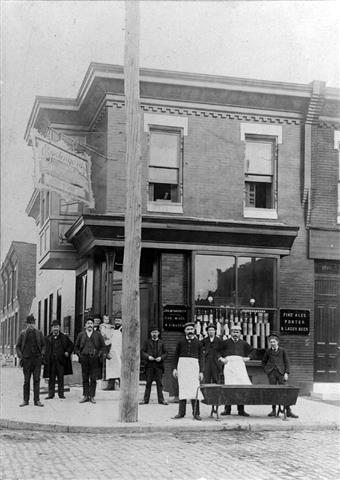1916: The Irish American Connection
Roger Casement (left) with Clan na Gael leader John Devoy (right).
It may well be assumed by many that Irish America played little or no role in the lead up to the 1916 rebellion in Dublin. The reality however, was quite different. Through Clan na Gael, an Irish Republican organization which emerged out of the 19th Century Fenian Brotherhood, much of the finance for the insurrection was provided. Their financial support was critical and it is believed that they were the single biggest financier of the Rising, their money paying for much of the guns and ammunition used.
In the aftermath of the Irish War of Independence and the Civil War, some of those who had participated in 1916 left Ireland for North America and disappeared from history. Little is known of what happened to many of these brave men and women, and in some cases it is probable their descendants are blissfully unaware of their involvement in what many believe is the most important event in Ireland's history.
'Stories from 1916' will provide a platform for relatives to both explore more fully the role of their antecedents and through their life experience allow us to take the story of the heroic men and women beyond that Easter Week almost 100 years ago. We aim to seek out as many of these Irish American connections as possible and help them to tell the story of their family's involvement in the 1916 Easter Rising.
Share the story here and join the conversation!
John Devoy, leader of Clan na Gael.
Clan Na Gael
As immigration to America from Ireland increased in the latter part of the 19th century, a number of Irish nationalist organizations were set up. They funded republican movements in Ireland and sourced arms for proposed insurrections. Clan na Gael was one such organization. By the 20th century the main goal of Clan na Gael was to assist the Irish Republican Brotherhood in achieving its aim of an independent Ireland. It did so using fundraising campaigns, lecture tours of Irish nationalist leaders such as Padraig Pearse and the sale of newspapers such as The Irish Press and The Gaelic American. Another tactic was to promote anti-British sentiment in America and to prevent the entry of the United States into a potential war with Ireland.
Clan na Gael continued to support the IRB after the Rising, and hosted Irish leaders such as Eamon de Valera and Harry Boland in their fundraising and publicity efforts for the fledgling republic. After this period, a series of splits which mirrored those in the Irish republican movement at home, undermined the Clan's efficacy. After 1924, John Devoy’s faction voted to disband, due to the Civil War being over, however Joseph McGarrity remained active, and his faction of Clan na Gael would go on to play a significant part in the fundraising campaigns for the republican movement in later years.
John Devoy
Born in 1842 in Kildare, John Devoy was educated and later employed as a clerk in Dublin. This was where he came into contact with nationalist political activists, at Irish language evening classes. He was eventually sworn into the secret society known as the Fenians in 1961, and after a year serving in the French Foreign Legion, he worked as a Fenian organizer in Naas, Co. Kildare. In 1866 an uprising that was thwarted in the planning staged saw Devoy arrested for treason, a crime for which he served 15 years in prison. On his release he was exiled to America. He immediately joined Clan na Gael, the successor to the Fenian Brotherhood in America and a sister organization to the Irish Republican Brotherhood.
As leader of Clan na Gael, he orchestrated the escape of six Fenians from penal servitude in Australia, which gained significant publicity for the movement in America and in Britain. Devoy organized significant fundraising campaigns, thought to have contributed up to $100,000 towards the Easter Rising between 1913 and 1916. In addition to this he arranged the smuggling of arms into Ireland and hosted Irish nationalist leaders on tours of America. Although he was in his seventies at the time of the Rising, he wanted to take part in it. He was, however, unable to do that due to his failure to obtain the necessary travel papers in time.
Joe McGarrity's pub in Philadelphia. McGarrity is standing third from the left.
Joseph McGarrity
Joseph McGarrity was born in Co. Tyrone in 1892. At eighteen, he emigrated to Philadelphia, where he became a leading member of the Clan na Gael organization. As a successful businessman, Mcgarrity was able to support a number of Irish nationalist causes. He founded and ran The Irish Press, a newspaper that supported the War of Independence in Ireland. When Eamon de Valera travelled to the USA in 1919 he became a close ally of McGarrity, and supported his Philadelphia branch over John Devoy’s New York Fenians.
McGarrity opposed the Anglo-Irish Treaty and all recognition of the Irish Free State. He also fell out with de Valera over the founding of Fianna Fail and their entry into the Dail. McGarrity continued to support physical force republicanism into the 1930s, as a means to a united Irish Republic. He continued to be a respected republican leader for the IRA even after his death in 1940, which signed all its statements ‘J.J. McGarrity’.





